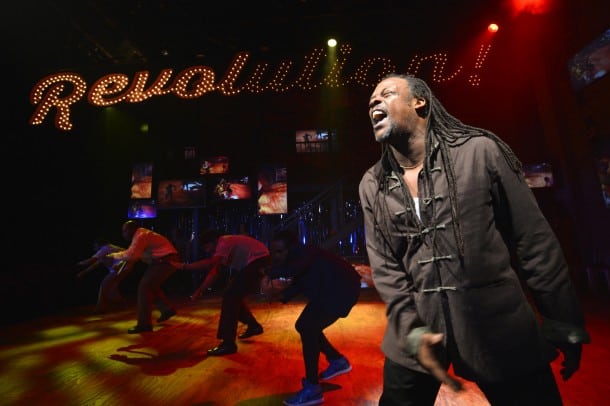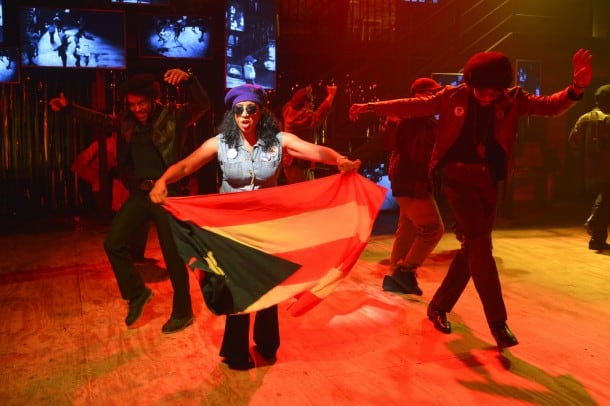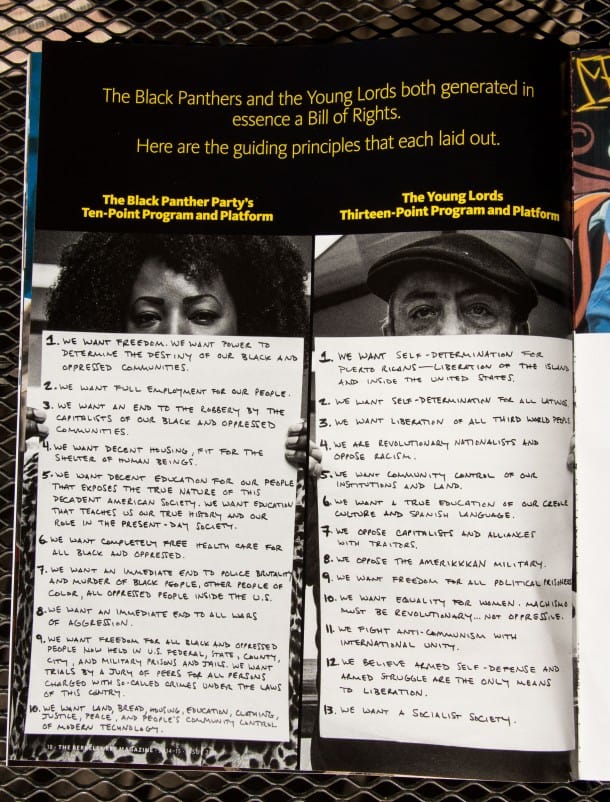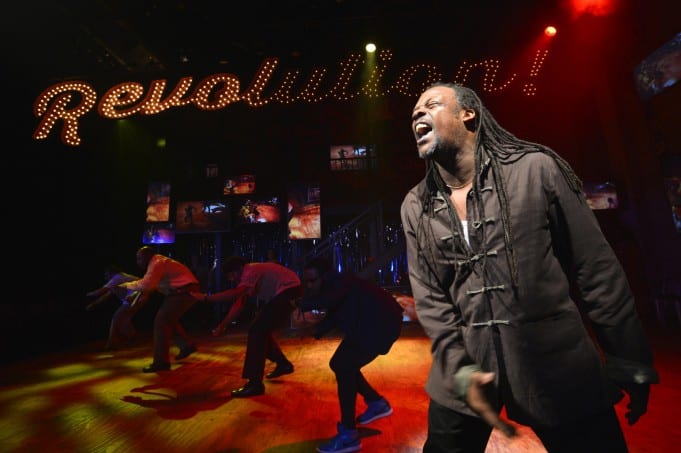
Necessary.
Going into opening night of Party People at Berkeley Rep this past weekend I thought I knew what was to come. We’d get an essentially rote, but entertaining look at the Black Panthers, Young Lords, and their struggle to achieve equality for blacks, latinos, and other minorities who were continually repressed by society, and especially government. No doubt the show, I suspected, would employ a song/scene/song structure, and would be full of colorful music juxtaposed against simmering tension.
Turns out, while some of my thoughts were mildly accurate, I was off the mark.
Party People, in fact, thanks to a performance group known as UNIVERSES (Steven Sapp, Mildred Ruiz-Sapp, and William Ruiz, aka Ninja), takes the standard musical formula and completely rips it up, unceremonious shreds it to pieces, and thankfully refuses to acknowledge the restrictions of standard theater convention.
And thank our lucky stars for that. This is pure adrenaline.
“They said you can be an American.”
An often unpredictable combination of musical performances (hip-hop, jazz, gospel, rock, blues), multimedia and spoken scenes, this is a musical that does not force-feed a historical perspective using literal devices. The victim card is never played. Rather, at least as it felt to this observer at Berkeley’s cozy Thrust Stage (where almost every seat is a good one, and, on this occasion, actors freely mingle with the audience), this show is all about feeling and, more generally, humanity. There’s tacit historical lessons here, I’m sure, but on this balmy Berkeley evening we need only experience it rather than read about it. Yet, how timely. Given today’s headlines–Michael Brown, Trayvon Martin–we’re reminded that history does indeed, sadly, appear to repeat itself.

One of several interesting themes that UNIVERSES explores is that of generational activism. One girl’s parents were absent. Rather than spend time with her, they were marching the streets, feeding other kids. Pushing the revolutionary needle, apparently, doesn’t come without cost.
Reminiscent of today’s increasingly common “drone wars” the new generation of would-be Panthers and Lords appear content to revolt from a distance, to fist pump with a Facebook Like, an Instagram or a Retweet. That, at least according to the parents. To their defense, the next generation, as they themselves explain, are trying to understand the past, deconstruct its meaning, and find ways to make it their own. To do anything otherwise would be artifice.
“When tyranny is law, revolution is order.”
Central to Party People are downright infectious performances. One moment an actor (notably, Steven Sapp) delivers a riveting monologue, the next participates in a physical (this show must be a physical and visceral thrill for them) musical number, before segueing into spoken word.
BLACK PANTHER PARTY
— The Black Panther Party (HQ in Oakland) was established in 1966.
— Issues BPP sought to address included: racial bias in the police force, urban poverty, lack of educational and economic opportunity, among others.
— Inspired in part by the teachings of Malcom X, its members “intended to establish a separate nation for black citizens.”
— By 1969, Hoover’s “government informants and agent provocateurs had thoroughly infiltrated” BPP leading to divisive cracks, disagreements, and, even rumors of internal assassination plots.
— Some view the Black Panthers as “crusaders of justice” while others as “disruptive extremists.”
Source: “A Revolution and its Legacy” by Madeleine Oldham (The Berkeley Rep Magazine, 2014-15, issue 2)
An obvious comparison might be American Idiot. Like that musical, which was developed and premiered at Berkeley Rep before going on to great success on Broadway, the set of Party People has a street vibe (exposed brick, city lights, fire escapes) stylishly intertwined with modernism (flat screens, video cameras, MacBooks). Both shows are feverishly energetic. And both also follow the journey of a central figure trying to come to terms with a (messed up) world. One difference, perhaps, is that this show feels slightly less cohesive – more like a series of vignettes loosely connected together by a few themes.
Using a live video feed is an especially interesting choice. Reinforcing the double entendre of the show’s name, Malik (Christopher Livingston) and his (incredible) rap partner Jimmy (William Ruiz) organize a party–a reunion that forms the foundation of the show. Through it all we get a live feed, as shot on the stage via video camera and projected–video music style–onto multiple monitors on set. The effect results in an anything-can-happen feeling that accentuates the drama.
Team Stark is on location @berkeleyrep. PARTY PEOPLE! #blackpanthers #younglords pic.twitter.com/WCedm8KNtp
— Stark Insider (@StarkInsider) October 25, 2014
As my wife likes to remind me from time to time, I grew up on a “happy farm” in Ottawa. Revolutionaries in my eyes at the time had names like Gordie Howe, Wayne Gretzky, and Mario Lemieux. To me, it’s one of the most satisfying aspects of live theater – gaining new perspective, new understanding. And while my parents (a grade school teacher and High School principal) taught me amazing things (biology, literature, that you can make a volcano boil over with baking soda) I can always count on a show like Party People to help fill in the blanks, and, in this case, to help understand important cultural moments in this country’s history.





